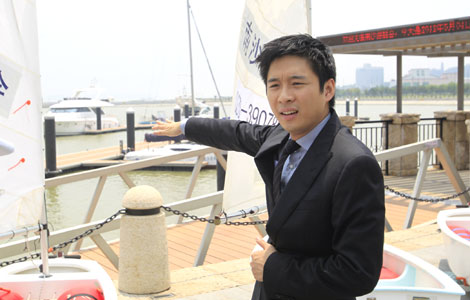
| ?
 |
|
Eric Fok, president of Nansha Marina, a top Chinese yacht club, introduces the marina in Nansha district of Guangzhou on Friday. [Photo / China Daily] |
Since it started trial operations in January this year, the marina has sold out the first 60 memberships, marina president Eric Fok said.
Preparations are under way for the second phase of construction after the club saw such strong demand for the first 70 berths, he said.
"It would take two to three years to satisfy the current demand," Fok said, adding that income has far exceeded expectations.
When it is fully operational, the marina will have 352 wet berths and 120 dry stack berths.
Built using investments from the Hong Kong-based Fok Ying Tung Group, the marina is the only one on the Chinese mainland to have received the Five Gold Anchors Award from the Yacht Harbor Association of the United Kingdom.
"With 18,000 kilometers of mainland coastline, 14,000 km of island coastlines, 6,500 islands and 24,800 lakes, China has huge potential to develop the 'water market', including the yachting market. Guangdong is one of the best places in this regard," Fok said.
Using the experience of Western countries, analysts theorize that a yachting market starts to develop when the per capita GDP of an area reaches $3,000 and starts growing rapidly with a per capita GDP of $5,000 to $6,000.
As one of the frontiers of China's reform and opening-up, the Pearl River Delta saw its per capita exceed $10,000 in 2008.
Over the next 10 years, the number of yachts in China will grow by 100,000 and the market will be worth between 50 billion yuan ($7.8 billion) and 100 billion yuan, according to a report released by the China Cruise and Yacht Industry Association late last year.
China's yacht market has experienced rapid development in the last two years. At the end of 2010, there were 1,500 yachts in China, 300 of which were high-end vessels each worth more than 5 million yuan.
Twenty-two marinas are currently operating in China, and 26 under construction while 45 others are in the design phase.
The State Council announced in 2009 that regions with the appropriate resources will receive support for developing tourism based on cruises and yachts.
Guangdong is well positioned for developing a leisure boating industry. It has a thriving coastal tourism industry, a high per capita GDP, and it is close to Hong Kong, Macao, Taiwan and Southeast Asia, which have active yacht markets, according to a plan released last October by the provincial transportation department.
At the end of 2010, Guangdong had a total of eight yacht clubs and six other yacht docks in coastal cities with 525 combined berths. Five yacht clubs were under construction at the time, which would add 1,800 new berths when completed.
The demand for private yachts is expected to grow quickly in the long term.
The number of yachts in use in Guangdong is expected to top 8,000 by 2015. The number of yachts from outside Guangdong that are registered in or visiting Guangdong is predicted to reach 2,000 by that year.
The members of Nansha Marina come from Guangdong, Hong Kong and Macao, Fok said.
Authorities in the three regions are working to ease barriers to yacht travel among them, but there is a need to address issues such as licensing, vessel inspection, safety standards and port administration.
As a member of the Guangzhou city committee of the Chinese People's Political Consultative Conference, Fok also hopes his marina will become a new highlight of Nansha district, the only district in Guangzhou with a coastline.
The bonded area at the Port of Nansha also makes the area attractive to international yacht manufacturers, Fok said.
Fok's family invested in the first golf course in China and the first five-star hotel in Guangzhou, which have both enjoyed lasting success. With the marina, Fok hopes to lead the market again and help boost the confidence of investors.
Fok's family has strong connections with international sports organizations and has invested a lot in China's sports sector. The marina is offering sailing courses to children in the hope of popularizing the sport in China.
To promote the development of marinas in China, Fok said it is important to have more public docks, easier customs clearance, seamless connection with overseas destinations in regulations, and personnel training for marina management.
Contact the writers at [email protected] and [email protected]